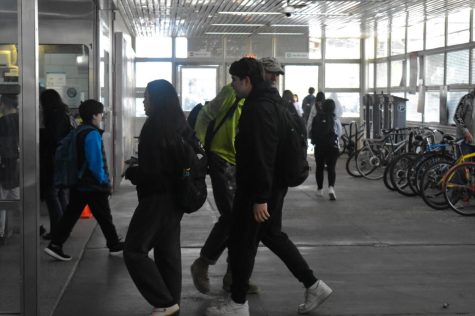Opinion: Columbia needs to do more for low-income students
May 5, 2023

Even though Columbia prides itself on being inclusive, the college makes learning inaccessible without a better plan for affordability.
To start, it’s hard to see how tuition increases will help students in the long run at the school.
In 2022, tuition increased 10% and will be going up another 5% this fall, for a total of almost $31,000 — before financial aid — to attend full-time as an undergraduate. However, this large sum doesn’t begin to paint the picture of how much money students spend at this school. On top of tuition, students pay a slightly reduced U-Pass fare, an “institutional fee” of $1,479, and that barely even scratches the surface of textbook costs, subscriptions, access codes, materials and more.
Often the most confusing part for students is the misleading information about finances needed for classes interdepartmentally. In some courses, a textbook listed in the syllabus isn’t really needed or is very expensive. Some professors will ask you to buy the book and others will provide PDFs of chapters.
Although all these resources are ideal and valuable in certain settings, it’s not worth putting yourself in a state of financial anxiety. There need to be more policies within administration and departments that lessen this confusing material struggle for low-income students.
Each one of Columbia’s students has a story to tell financially. Living in Chicago isn’t cheap, and although some students are lucky to get financial help from their parents, this isn’t the case for some.
Internal scholarships are an option for some low-income students but not for all. Most scholarships still have requirements of a 3.0 GPA, which some struggling students find hard to maintain and achieve. Not to mention, the scholarship deadlines come and go so quickly, so it’s hard for students to keep track of which scholarships have been extended, which applications are closed or even when deadlines are quickly approaching.
This lack of transparency doesn’t encourage or welcome. Instead, it makes students weary. Even if a student can receive a scholarship through Columbia, refunds aren’t issued until around the sixth week of the semester, which defeats the purpose of using the money toward textbooks needed almost immediately after the first week of school.
The school and its academic departments have the power needed to eliminate the use of costly textbooks and access codes like ones through Pearson Revel. The problem with Pearson Revel and other online-only materials is that there is only one avenue of getting them: paying full price.
At least with print textbooks, there are more affordable options to access the material like renting it through the college bookstore; with online access codes, there’s no affordable alternative. Whether they choose to address this shows the importance of students in academic and financial settings at the school.
Although the school does as much as it can for students in need through financial assistance programs like ColumbiaCares or the Book Charge Program, not many people know these options are available to them partially because they aren’t widely talked about. Professors should encourage reaching out for help financially instead of shaming students for not dropping the class or being more aware of a class’s financial burden. Students also can ask for help when needed.
Overall, one solution we can all agree on is the need for Columbia to listen to the students it serves. Right now, they are begging and complaining about an institution they think doesn’t care about their learning. Right now, students are weighing out the costs of a beneficial college education because of textbook prices and art supply costs.
Columbia’s obligation as a student-forward institution is to help students find an answer to affording college, whether it starts at textbook prices or changing the stigma of financial aid with low-income students. If the administration doesn’t move towards a more equitable solution, it is only a matter of time before low-income students will leave.







